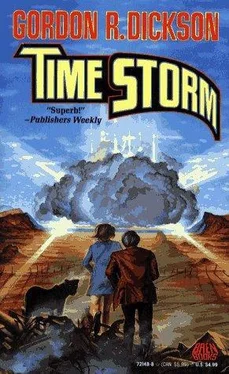Gordon Dickson - Time Storm
Здесь есть возможность читать онлайн «Gordon Dickson - Time Storm» весь текст электронной книги совершенно бесплатно (целиком полную версию без сокращений). В некоторых случаях можно слушать аудио, скачать через торрент в формате fb2 и присутствует краткое содержание. Год выпуска: 1992, ISBN: 1992, Издательство: Baen Books, Жанр: Фантастика и фэнтези, на английском языке. Описание произведения, (предисловие) а так же отзывы посетителей доступны на портале библиотеки ЛибКат.
- Название:Time Storm
- Автор:
- Издательство:Baen Books
- Жанр:
- Год:1992
- ISBN:0-671-72148-8
- Рейтинг книги:4 / 5. Голосов: 1
-
Избранное:Добавить в избранное
- Отзывы:
-
Ваша оценка:
- 80
- 1
- 2
- 3
- 4
- 5
Time Storm: краткое содержание, описание и аннотация
Предлагаем к чтению аннотацию, описание, краткое содержание или предисловие (зависит от того, что написал сам автор книги «Time Storm»). Если вы не нашли необходимую информацию о книге — напишите в комментариях, мы постараемся отыскать её.
Time Storm — читать онлайн бесплатно полную книгу (весь текст) целиком
Ниже представлен текст книги, разбитый по страницам. Система сохранения места последней прочитанной страницы, позволяет с удобством читать онлайн бесплатно книгу «Time Storm», без необходимости каждый раз заново искать на чём Вы остановились. Поставьте закладку, и сможете в любой момент перейти на страницу, на которой закончили чтение.
Интервал:
Закладка:
“Marc,” said Obsidian, “I assure you, that was not a representation of lines of force from what you call the time storm. It was a projected pattern of conceptual rhythms common to all minds in our present-day culture. If you had shown a capability for responding to those rhythms, the pattern would have evoked some common images in your mind—water, gas, star, space... and so on. Apparently, it didn’t; so we have to conclude that you don’t have the capability to respond in modern terms. That’s all. You don’t gain anything by this insisting that you were looking at a representation of temporal force lines.”
“I see!” I said.
Because suddenly I did. And suddenly I was so sure I was right that I went ahead without even bothering to check the words out in my head before I said them.
“In fact,” I said, “I see a lot of things. One of them is that I understand you better than you understand me—and I’m going to prove that right now. You see, I know you can’t sluff me off and send me back with that answer, if I say the proper words. Your responsibility reflex won’t let you; and I’m going to say the proper words now. The words are—you and these people here, and everyone else you know, have one galloping cultural blindness. You’re dead blind in an area where I’m not; and I can see it where you can’t, because I’m standing outside your culture and looking in at it. Your whole set of rules is based on the fact that you can’t deny me a hearing on that point. Now that it’s been raised, you have to settle conclusively whether I’m right about what I’m saying, or wrong. If I’m wrong, then you can get rid me. But if I’m right, then you, all of you, are going to have to learn different—from me. Am I right?”
I stopped speaking and waited. They merely stood there.
“Well?” I said. “Am I right, or aren’t I? Am I entitled to a hearing or not?”
They looked at each other and stood for a moment longer. Then they all turned back to me.
“Marc,” said Obsidian, “we’ll have to consult about this. In theory at least, you’re right. You’ll get your hearing. But now we have to talk the whole matter over, and that’s going to take a little time. Meanwhile, because of the importance of your challenge to us, it seems you’re going to have to learn our way of communicating after all.”
35
It developed that the reason they had not tried to teach me, and Porniarsk .for that matter, how to communicate in their way was because of an assumption on their part that, conceptually, we were not up to such education. But since I had now told them that I believed the shoe was on the other foot, and that I knew things of which they couldn’t conceive, their original reason for not teaching me had become indefensible. In short, whether I could actually handle their language effectively, or not, I had to be given a chance to explain myself in it, so that the accusation couldn’t arise that I had failed to make my point because I had not been given the chance to state it in fully understandable terms.
That much established, the actual process of learning turned out to be easy. As Obsidian had said, they had devices and techniques for teaching. Within twenty-four hours, Porniarsk and I could handle all four modes of their communication. These were sound; signal (limb-waving, etc.); attitudinal (which was really another form of signal, since it meant communicating with physical attitudes—body language); and modification-of-surroundings, which essentially meant communicating by playing games with the surrounding scenery, whether illusory or real.
These four modes actually duplicated each other. That is, they had each been single, exclusive methods of communication originally, and had been combined as amplifying redundancies. Actually, I would be able to make my argument completely in the verbal mode. But if I should be questioned on a particular verbal statement, I could now nail down what I meant by repeating what I had said in one or more of the other modes. In theory, any statement made in as few as two modes established its message beyond any possibility of ambiguity.
So, I was ready for argument in twenty-four hours. The debate was not called to order, however, for the equivalent of three more Earth days. I was not too unhappy about that because it gave me time to do some thinking. Under pressure, I had jumped to a conclusion, there in that moment when Dragger and the others had turned to walk out; and that jump had been genuine inspiration. But now I needed to build that inspiration up into a solid, cohesive argument.
When the meeting was finally called to order once more, the number of the universal community’s members present had grown from five individuals to thirty-two. The space that arranged itself around us, consequently, was large and had sloping sides around the flat central area; so the spectators looked down on Dragger and me as if they were a crowd in a small arena or a lecture hall.
Dragger began by replaying what had happened on our first meeting. It was a little strange to stand there and see myself, in apparently solid replica, demanding that the five come back and listen to me. When this reached an end with Obsidian’s last words to me, the illusory figures of our former selves winked out and Dragger turned to me.
“You’re going to point out a cultural blindness to us, Marc,” she said. “Go ahead.”
“All right,” I said. “As briefly as possible, then—the first evidence I noticed of a cultural blindness was during the first few days that Obsidian and I talked. We found out then that he had trouble understanding what I meant, in spite of the fact that he’d been trained by your equipment. On the other hand, I was understanding him fairly well, in spite of the fact that he was trying to gather information on my culture, rather than teaching me about yours. You might want to check your records on that, sometime, to see what I mean.”
“We can show it,” put in Dragger.
The illusory figures appeared again. This time, they were Obsidian and myself talking back outside the summer palace. This was a bit of assistance I had not figured on. I stood there, as my image pointed out to Obsidian that he was like someone who had grown up thinking everyone spoke only one language and was having difficulty entertaining the idea that there might be other words possible for a familiar object.
The second set of figures disappeared.
“This started me thinking,” I went on. “From the beginning, in your contact with us, you’ve assumed the only possible solution to my group existing in the same time with you people would be for us to adopt everything that was part of your culture and discard anything of ours that didn’t fit. As with the language situation, your thought seemed to be that there was one, and only one, right way of doing things.”
I stopped and looked at Dragger, giving her a chance to argue this point. But she said nothing and seemed to be merely waiting. I went on.
“As far as I can gather,” I said, “you wouldn’t have had any intention of testing me for present-day abilities, even to this small extent you tried here a few days ago, except that Obsidian had turned up a couple of anomalies in the characters of me and my people that—because it’s a cultural imperative on you to base your conclusions on certainties—made it necessary to check. The first anomaly was that I said we had moved ourselves to your present time deliberately, using the time storm forces to do so.”
I stopped again and looked at Dragger.
“Would you like to replay that particular conversation?” said Dragger. “Very well.”
The figures of myself, Ellen, and Obsidian appeared before us.
“... And, of course, we wanted to collect data toward understanding the accident that brought you here, ” Obsidian was saying.
Читать дальшеИнтервал:
Закладка:
Похожие книги на «Time Storm»
Представляем Вашему вниманию похожие книги на «Time Storm» списком для выбора. Мы отобрали схожую по названию и смыслу литературу в надежде предоставить читателям больше вариантов отыскать новые, интересные, ещё непрочитанные произведения.
Обсуждение, отзывы о книге «Time Storm» и просто собственные мнения читателей. Оставьте ваши комментарии, напишите, что Вы думаете о произведении, его смысле или главных героях. Укажите что конкретно понравилось, а что нет, и почему Вы так считаете.












